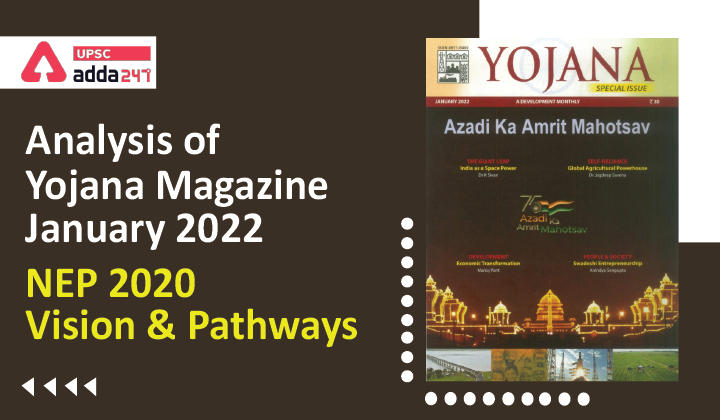Table of Contents
ANALYSIS OF YOJANA MAGAZINE: ”NEP 2020: Vision & Pathways”
RELEVANCE
”GS 2: Education, Issues Relating to Development”
INTRODUCTION
- NEP 2020 is the first education policy of the 21st century and replaces the thirty-four year old National Policy on Education (NPE), 1986.
- Built on the foundational pillars of Access, Equity, Quality, Affordability and Accountability.
- This policy is aligned to the 2030 Agenda for Sustainable Development and aims to transform India into a vibrant knowledge society and global knowledge superpower by making both school and college education more holistic, flexible, multidisciplinary, suited to 21st century needs and aimed at bringing out the unique capabilities of each student.
- The policy has been formulated after a very detailed consultative process, unprecedented in depth and scale.
- Committee for the Draft National Education Policy’ was constituted under the Chairmanship of eminent scientist Padma Vibhushan, Dr K. Kasturirangan, which submitted the Draft National Education Policy, 2019 to the Hon’ble Human Resource Development Minister on 31st May, 2019.
THE VISION OF THE POLICY
- An education system rooted in Indian ethos that contributes directly to transforming India, that is Bharat, sustainably into an equitable and vibrant knowledge society, by providing high-quality education to all, and thereby making India a global knowledge superpower.
- The curriculum and pedagogy of our institutions must develop a deep sense of respect towards the fundamental duties and Constitutional values, bonding with one’s country, and a conscious awareness of one’s roles and responsibilities in a changing world.
- To instill a deep-rooted pride in being Indian, not only in thought, but also in spirit, intellect, and deeds, as well as to develop knowledge, skills, values, and dispositions that support responsible commitment to human rights, sustainable development and living, and global well-being, thereby reflecting a truly global citizen.
THE FUNDAMENTAL PRINCIPLES OF THE POLICY
- recognizing, identifying, and fostering the unique capabilities of each student, by sensitizing teachers as well as parents to promote each student’s holistic development in both academic and non-academic spheres.
- flexibility, so that learners have the ability to choose their learning trajectories and programmes, and thereby choose their own paths in life according to their talents and interests;
- no hard separations between arts and sciences, between curricular and extra-curricular activities, between vocational and academic streams, etc. in order to eliminate harmful hierarchies among, and silos between different areas of learning.
- multidisciplinarity and a holistic education across the sciences, social sciences, arts, humanities, and sports for a multidisciplinary world in order to ensure the unity and integrity of all knowledge;
- creativity and critical thinking to encourage logical decision-making and innovation;
- ethics and human & Constitutional values like empathy, respect for others, cleanliness, courtesy, democratic spirit, spirit of service, respect for public property, scientific temper, liberty, responsibility, pluralism, equality, and justice;
- promoting multilingualism and the power of language in teaching and learning;
- focus on regular formative assessment for learning rather than the summative assessment that encourages today’s ‘coaching culture’;
- respect for diversity and respect for the local context in all curriculum, pedagogy, and policy, always keeping in mind that education is a concurrent subject;
- outstanding research as a corequisite for outstanding education and development;
- continuous review of progress based on sustained research and regular assessment by educational experts;
- a rootedness and pride in India, and its rich, diverse, ancient and modern culture and knowledge systems and traditions.
CONCLUSION
The policy is both global and local in its outlook and intent. It makes a significant headway from earlier policies by putting quality education as the topmost agenda of educational reforms, strengthening the foundations of education, catering to the educational needs of the most disadvantaged, and making India a global leader in education.



 TSPSC Group 1 Question Paper 2024, Downl...
TSPSC Group 1 Question Paper 2024, Downl...
 TSPSC Group 1 Answer key 2024 Out, Downl...
TSPSC Group 1 Answer key 2024 Out, Downl...
 Cabinet Ministers of India 2024, New Cab...
Cabinet Ministers of India 2024, New Cab...







